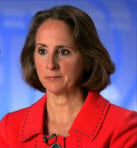For 9 months AstraZeneca ($AZN) has had the sales of its blockbuster heartburn drug Nexium protected by a bureaucratic dam that has kept generics from getting to market. But the agency opened the floodgates today, approving a copy of the $3 billion seller from Teva Pharmaceutical Industries ($TEVA).
 |
| Kathleen Uhl |
The agency said that Teva subsidiary Ivax Pharmaceuticals was approved to market esomeprazole in 20-mg and 40-mg capsules. "Health care professionals and consumers can be assured that these FDA-approved generic drugs have met our rigorous standards," Kathleen Uhl, director of the Office of Generic Drugs in the FDA's Center for Drug Evaluation and Research said in an FDA release. "It is important for patients to have access to treatment options for chronic conditions."
The U.S. patent on Nexium expired in May but India's Ranbaxy Laboratories held the first-to-file approval for the drug, which would have allowed it 180-days of exclusive sales of the generic. The problem is the FDA last year banned the plant approved to make the drug and so Ranbaxy has been unable to get its copy to the market. The FDA, under pressure to allow other generics makers to produce the popular heartburn med, cancelled Ranbaxy's exclusive in November. The FDA at the time also cancelled Ranbaxy's exclusive on Novartis' ($NVS) antiviral Valcyte and approved generics from Endo Health Solutions ($ENDP) and Dr. Reddy's Laboratories, but it did not say what its plans were for generics of Nexium.
It was probably waiting for the inevitable lawsuit, which Ranbaxy did in fact file, in hopes of preserving its place at the front of the line. The agency moved past that today with the Teva approval.
The FDA has been working to find a way around its own rules, since facing the same issue when Novartis' heart drug Diovan went off patent in 2012. At that point, the FDA had not banned the Ranbaxy plant in Toansa but had cited it for numerous quality and drug testing issues and Ranbaxy was working to get the issues resolved. Mylan ($MYL) tried to get Ranbaxy's exclusive for that drug killed but the FDA at the time defended it, indicating it didn't think it possessed the power to cancel it. The agency then worked with the Ranbaxy, allowing it to get its Ohm Laboratories plant in New Jersey approved to make generic Diovan, but the process delayed a generic by nearly two years. That led to criticism of the agency because consumers were left paying the higher prices for branded drug while the process dragged on.
AstraZeneca has made the most of the delays, managing to sell more Nexium last year than the year before. The products raked in $2.8 billion in the first three quarters of last year. It sold about $1 billion in just the third quarter.
- here's the FDA announcement